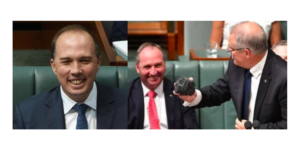Federal Politicians: Bogans, Boofheads, Bullies and Beers

The allegations made by Brittany Higgins about being sexually assaulted in parliament shocked the nation — including the Prime Minister himself, leading to calls for a investigation into the allegations as well as a broader inquiry into how a woman could possibly have been left naked and alone for hours in one of the most secure buildings in the nation.
But many believe the alleged incident is a symptom of broader issues, asking: Should we really be that surprised given the way our politicians generally behave?
Since the Higgins’ allegations became public, resulting in national (perhaps even global) scrutiny for Australian politicians, many people (mostly women) have come forward with their own stories. Numerous reviews are underway, near completion or have been finalised.
Training for politicians to be respectful in the workplace are said to have already been implemented and, yet, the seriousness of these issues seems to be lost with some of our politicians.
Lack of acceptance
Liberal Senator David Van has recently apologised “unreservedly” for interjecting with audible ‘growling noises’ as Senator Lambie spoke in Federal Parliament, but said he does not “accept the characterisation” of his conduct.
His inability to properly accept responsibility may be seen as concerning, as his conduct clearly amounted to disrespectful behaviour, and some believe amounted to a mockery of the Parliamentary process.
In the eyes of many, our politicians would do well to remember that they are elected representatives, and the public can expect them to act with a level of decorum and professionalism at all times.
Perhaps unfortunately, Mr Van’s behaviour made headlines that almost eclipsed the important findings released by a landmark report into the broader toxic culture within federal politics.
Toxic political culture
Sex Discrimination Commissioner Kate Jenkins was charged with undertaking a review into culture within federal politics earlier this year.
That review is now complete and, perhaps unsurprisingly, confirms there is an ingrained ‘boys’ club’ mentality in parliament, where bullying, harassment and even abuse are ‘normalised.’
These findings are consistent with those of the 2018 national respect@work national inquiry, which identified that one in three workers have faced sexual harassment and 84% of those did not seek support or advice.
Kate Jenkins recommended an overhaul of federal parliament’s toxic workplace culture after finding gender inequality in the political ecosystem was a key driver of bullying, sexual harassment and sexual assault.
The review found that almost 40% of respondents in parliamentary workplaces had personally experienced bullying and 33% of people had personally experienced sexual harassment, with 1% experiencing an actual or attempted sexual assault.
No more insults and slanging matches
The report recommends a series of fundamental changes, including changes urging presiding officers in Parliament to work towards eliminating language, behaviour and practices that are sexist or otherwise exclusionary and discriminatory.
This is important. The slinging matches from federal parliamentary sittings make great publicity and media fodder, but they’re incredibly damaging. They are also a key indicator of the lack of respect politicians have for one another. Disrespect for the authority of one’s position or power along with disrespect of others, as keeps being reiterated time and again, is at the very core of all forms of harassment, including sexual harassment.
Currently, politicians are virtually untouchable when it comes to behaving badly, unless, as was the case with Sarah Hansen Young and former federal parliamentarian David Leyonhjelm legal action is pursued. The good news is that this could soon change, if recommendations from the report are adopted.
Kate Jenkins has called for a new code of conduct for federal MPs and their staff, enforced by an Independent Parliamentary Standards Commission (PSC) charged with the responsibility to investigate complaints as well as the powers to punish those who breach the standards.
Making MPs accountable for poor behaviour
Under this procedure, if a complaint is upheld by the PSC, an MP could lose their right to have their travel paid for. For more serious complaints, Parliament could vote to withhold an MP’s salary, suspend them from Parliament and dock their communications budget to match compensation paid to a complainant.
It remains now for the Federal Government to adopt and implement the recommendations. It’s also time for governments and businesses — Australia wide — to stop putting sexual harassment, bullying and employee misconduct in the ‘too hard’ basket. The economic and social costs of it continuing at alarming rates are wide-reaching.
Yes, our personal boundaries, levels of acceptance and tolerance levels are as unique as our fingerprints, but victims need to be heard. Needless to say, strong leadership is required to stamp out misconduct at work. But everyone who works within a team also has a responsibility to contribute to the creation of safe workplaces.
All complaints, no matter their severity or nature, need to be dealt with systematically, so that they are recorded, supported, investigated and resolved. Consequences for misconduct need to be strictly enforced and all organisations need to be prepared to be transparent and accountable.







